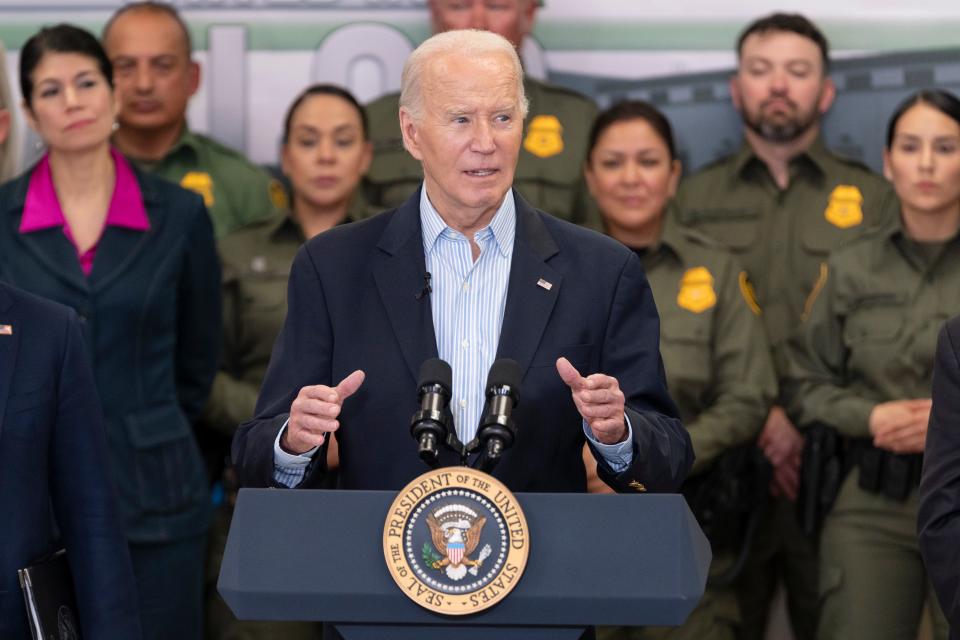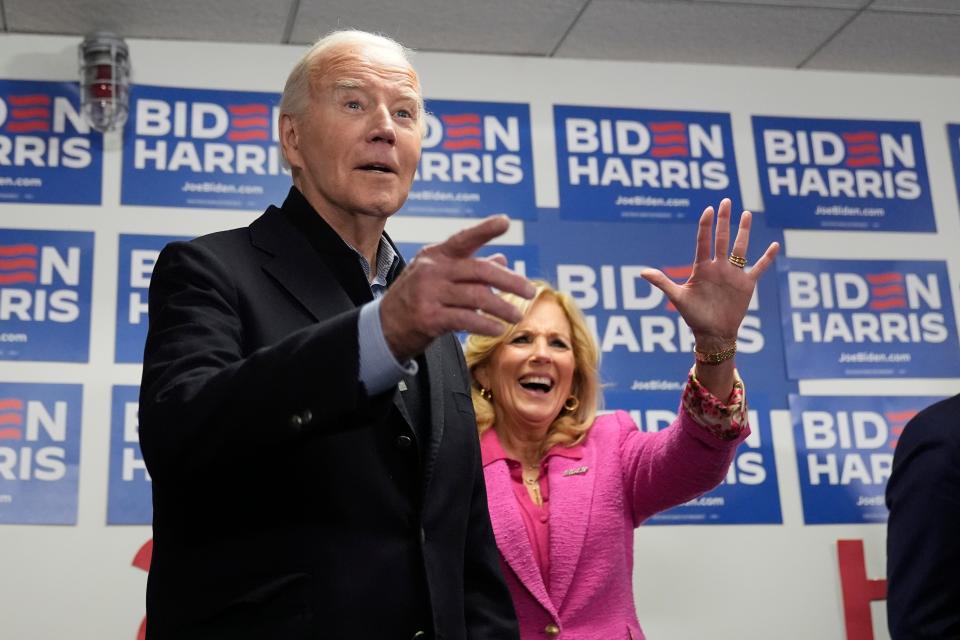Joe Biden's problem with angry liberal voters isn't going away. Not on Super Tuesday.
There are two ways to look at last Tuesday's Michigan Democratic primary, when 13% of the voters picked "uncommitted" over President Joe Biden.
One: Biden has a serious problem brewing with young progressive voters angry that he has not done more to constrain Israel's military action in Gaza.
Two: That problem received outsized media attention because there is no real Democratic primary contest to focus on and all those cable news pundits need something to talk about.
Both are true. And both are likely to continue as voters cast ballots this week on Super Tuesday.
But we don't know yet if protest votes in a primary Biden can't lose will swing the same way in a general election he could certainly lose to former President Donald Trump.
And Trump may be Biden's best ally in all this, because the one-termer is still rehashing his selective travel ban on Muslims while shrugging off foreign policy challenges as someone else's problem.
The Gaza issue isn't going away for Biden
Protesters have disrupted Biden speeches at campaign events this year, drawing attention to the five months of violence, death, confusion and hunger as Palestinians are pushed around an increasingly shattered Gaza Strip by Israel's army. The conflict divides Democrats more than Republicans.
A Reuters/Ipsos poll released Thursday showed Biden tied with Trump at 36% each in a general election rematch, but it also showed a majority of voters who identified as Democrats being less likely to back a candidate proposing more military assistance to Israel in the aftermath of the Oct. 7 Hamas attacks.
That poll landed on a day when more than 100 Palestinians were killed and more than 700 were wounded while waiting in line for food, in a conflict with a death toll that has surpassed 30,000, according to the Gaza Health Ministry and Hamas.
Larry Sabato, director of University of Virginia's Center for Politics, told me he found news coverage of the Michigan protest vote "overly dramatic" and now is watching to see if other states with options for "uncommitted" or "no preference" see similar impacts.
Michigan as a warning sign: Biden should heed the Gaza protest vote warning in Michigan. It could cost him in November.
The Michigan effort was well organized, with U.S. Rep. Rashida Tlaib, a Palestinian American Democrat from that state, leading the charge.
Biden was slow to shift his rhetoric on what is happening in Gaza but has stepped up criticism of Israeli Prime Minister Benjamin Netanyahu. That came too late in Michigan.

“I think if he had known how Netanyahu was going to handle Gaza, he would have been more careful in his proclamations of support for everything that Netanyahu and Israel did," Sabato said.
Will the protest vote carry through to November's general election?
“I don’t think its going to matter a whole lot," Sabato said. "And it's a long time until November and we will have loads of things that happen that change people's minds one way or the other.”
Super Tuesday could tell us how much voters care
Democratic voters will cast ballots this week on Super Tuesday in 15 states.
Six of those states offer Democratic primary voters the option like Michigan to choose "uncommitted/noncommited" or "no preference" instead of Biden.
That could be another headache for Biden in North Carolina, the only swing-state voting Tuesday. Biden lost North Carolina in 2020 to Trump by less than 2 percentage points.
He and "no preference" are the only two ballot options for Democrats in that state Tuesday. Trump leads Biden by 5.7 percentage points in North Carolina in a general election rematch, according to an average of polling compiled by Real Clear Politics.
And North Carolina's Democratic voters have sent a primary message before to an incumbent president. President Barack Obama, seeking a second term in 2012, won 79% of the Democratic primary vote that year. But nearly 21% of those voters chose "no preference" instead, the only other option on that ballot.
Colorado adds 'noncommitted' to the primary ballot
In Colorado, Biden faces a "noncommitted" backlash after winning that state in 2020 with 55% of the vote. The Colorado Democratic Party chose to add "noncommitted" as a primary ballot option, even with an incumbent president seeking a second term.
Party Chair Shad Murib told The Colorado Sun in December, “We aim to provide as many choices as we can to our voters."
The border issue: Fixing the border crisis is bad for Trump and good for Biden. That's the problem.
The Colorado Palestine Coalition and Denver chapter of the Democratic Socialists of America have launched a campaign to get voters to go "uncommitted."
They're a little late to the game, compared with Michigan. But they're fired up all the same and calling for Biden's administration to stop pushing for military aid to Israel.
"Democrats have largely ignored the thousands of us protesting in the streets, emailing and calling their offices, and packing their town halls to demand an immediate and permanent ceasefire," the activists said on their website. "Our votes must be earned by immediate and drastic policy changes from the Biden Administration."
Was Michigan overhyped or a warning sign? Yes.
Matt Grossmann and David Hopkins co-wrote "Asymmetric Politics: Ideological Republicans and Group Interest Democrats."
Grossmann, a political science professor at Michigan State University, told me that 13% voting "uncommitted" in Michigan was "enough for a successful protest vote but not necessarily a demonstration of much for the general election."

He smells some media hype "in an otherwise dud of a presidential primary." But there is a political threat to Biden too, he added, with "plenty of swing Arab American voters who might vote for Trump or a third party in November, but they are mostly people with conservative views on other issues that might be pushed over the edge by Gaza."
Hopkins, a political science professor at Boston College, said the protest vote could come home to Biden by November.
"Voters who are sufficiently invested in politics to participate in low-turnout primary elections are very likely to support their party in general elections even if they have this or that objection to the policies of the nominee," Hopkins said, while warning that Biden still has to appeal to young progressives and independents who don't care for his Middle East policies. “It seems likely to me that the fall election will be mostly decided by people who aren’t voting in the primaries.”
The primary season will continue for Biden and Trump
Biden and Trump easily won their Michigan primaries. Biden touted the state's "diverse coalition" of voters that helped him defeat Trump there in 2020 and called for more. Trump mocked Biden for losing the city of Dearborn that night to "uncommitted."
They'll both win their Super Tuesday primaries this week as well. Panels of cable news pundits will talk for hours into the evening, as if any of this is competitive. Primary season just keeps churning along, even though the outcome is certain.
For Biden's potential supporters who are now critics of his approach to Israel and Gaza, that means more platforms for months to ask just how committed they can be. That's an uncomfortable spot for an incumbent.
But the critics have to also face an uncomfortable question. If their actions help Trump win, do they think America's foreign policy will improve on this, or any other issue?
Follow USA TODAY elections columnist Chris Brennan on X, formerly known as Twitter: @ByChrisBrennan
You can read diverse opinions from our Board of Contributors and other writers on the Opinion front page, on Twitter @usatodayopinion and in our daily Opinion newsletter.
This article originally appeared on USA TODAY: Super Tuesday will bring more voter problems for Biden
